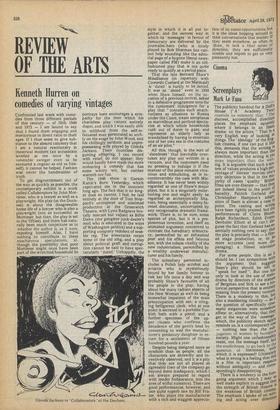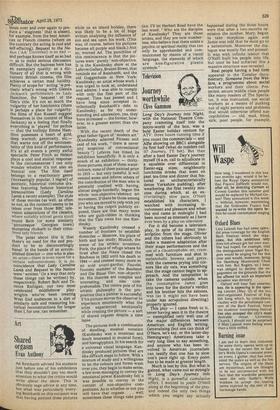Cinema
Screenplays
Mark Le 'Fan
• The publicity handout for A Doll's House (' A ' Academy Two) reminds us solemnly that: "1 discreet, accomplished direction places the emphasis. squarely where it belongs in an Ibsen drama: on the actors." That is a , very English way of looking 5` things. The' ideology 'of the English cinema, if one can put it like this, demands that the writing is always more important than the direction, while the acting is yet more important than the waiting. It is arguable that such a sYs' tern of values produces a high Per' centage of' literate 'movies: one 5 o. nly objection is that in the nr: jority of cases ' quality ' BrittsP films are over-literate — that the); are indeed literal to the point 0,; banality. Patrick Garland alw Christopher Hampton's adaPt" anon of Ibsen is almost a case in point. The casting and acting have been rightly praised: but the performances of Claire Bloom. Ralph Richardson, Edith Evans. Denholm Elliott et al can't dis• guise the fact that Garland has es: sentially nothing new to say; the' the play is precisely that — a fill12; ed stage production, or, to u` more accurate (and more gie. paraging) a filmed television drama. For some people, this is asi,t, should be. I can sympathise 1.01;," the argument that sugges' lbsen's play should be left te "speak for itself ". But one has only to look at the use of mele_.; drama by directors of the statUrv of Bergman and Sirk to see ahiS torical perspective that is entireu missing from the present venture' There is a modesty in this, bf also a maddening timidity — ' the question of specifically CIO' matic exigencies were somehogi effete: or, alternatively, that the, get in the way of the ' message which, the publicity sketch agsf„ reminds us, is a contemporary 0"„— nothing less than the ,jugation of women by bourgeo,' society. Might one unfashionah'Xt resist, not the message itself, bil.1 the explicitness, to go back to question of literalness, v11`,., which it is expressed? Ultimate', what is wrong is a feeling that this is a film in important respects without ambiguity — and corre _ spondingly disappointing. There is a tendency in the fore; going argument which I maY25t well make explicit to suggest tr"!s the strength of British theatre the weakness of British cineill,a: The emphasis I spoke of on Writ ing and acting over direction
tends over and over again to produce a ' staginess ' that is absent, for example, from the best American or French cinema (where on the contrary the acting is cool and self-effacing). Bequest to the Nation ('AA' Universal) is so bad — and perhaps knows itself as so bad — as to make serious discussion difficult. But the badness here has an exemplary quality: as a dictionary of all that is wrong with current British cinema, the film achieves a certan mad lucidity. Plenty of scope for' acting 'is precisely what's wrong with Glenda Jackson's performance as Lady Hamilton, the ' bequest ' ot the film's title. It's not so much the vulgarity of her histrionics (there is perhaps a place for vulgarity: the films of Ken Russell suggest themselves in the context of Miss Jackson) as a feeling that finally everything is ' played' for pathos — that the trollopy Emma Hamilton possesses a heart of gold, deep warmth, generosity, etc.— that warns one off the sentimentality of this kind of performance. It's at all events a pretty awful spectacle. Peter Finch as Nelson plays a cool and stoical response: in the circumstances I can only wonder whether it's not also an ironical one. The film itself belongs to a reactionary genre (increasingly popular, I regret) of patriotic, historical costume dramas featuring famous historical personalities (Lady Caroline Lamb a recent example). The style of these movies (as well, as often as not, as the content) seems to be taken over from those BBC television adaptations of the classics, where suitably attired gents stroll round Bath (or some similarly picturesque' Georgian town) muttering rhubarb to their crino • lined lady friends.
The point about this Is that there's no need for the end pro duct to be so disconcertingly banal. In the hands of an accom plished director — one who is also an artist—there is even room for a certain subversiveness. It is no coincidence that Lady Caroline Lamb and Bequest to the Nation Were' written '(in a way that only these things can be written) by,
respectively, Robert Bolt and Terence Rattigan, our two most
celebrated middlebrow play wrights who've been treating West End audiences to a diet of similarly safe and reassuring historical reconstructions for longer than 1, for one, can remember.



































 Previous page
Previous page